O wounded town of Bethlehem
How sad we see thee cry
Above thy curfewed, empty streets
The belching tanks roll by
Yet from deep memory springeth
The hope of all the years
God’s kingdom come
God’s will be done
On earth, relieved of tears


How much is a trillion? A million seconds is 12 days. A billion seconds is not quite 32 years. A trillion seconds is 31,688 years. — anonymous
O wounded town of Bethlehem
How sad we see thee cry
Above thy curfewed, empty streets
The belching tanks roll by
Yet from deep memory springeth
The hope of all the years
God’s kingdom come
God’s will be done
On earth, relieved of tears
by Ken Sehested
(sung to the tune "Old Hundredth")
Oh, Blessed One, choired angels sing
Of life surrendered, offering
The power to bless as blessed we are
To welcome strangers near and far.
Oh, Ancient Promise, tune thine ear
To pain and suff’ring, linger near.
Cast off the rule of wail and woe.
Thy tender love on us bestow.
O, Jealous One, of cov’nant vow,
Recast the sword from threat to plow.
Remold Earth’s fury by thy Word
All flesh observe thy grace conferred.
May all my ways through all my days,
Befriend thy justice, sing thy praise.
Conformed no more to sin’s distress.
Thy sovereign reign uphold and bless.
My heart’s desire shall always be,
Nearer—my God—always to thee.
My soul, content, now finds its home
In sheltered hearth no more to roam.
These are the words we long to hear:
Sweet tidings sound, of hope and cheer.
Thus, in death’s hour, our final test,
Our hearts secured, by love possessed.
Sing to our God with cheerful voice
Let Resurrection joy foretell
Life in the Spirit’s breath rejoice
The Most High One is God indeed
Without our hand the world was made
Yet would not leave us in our need
But walks among us unafraid
Therefore, lift hand in earnest praise
With joyful heart rise up and sing
Mercy now marking all our days
Obedient love our offering
Come, Spirit, set our lives afire
With hopeful dreams of earth renewed
With us abide, with us conspire
For wrath’s demise, all death subdued
Nearer, my God, to Thee I cling
May grace forever mark my way
And though I face death’s final sting
I know Thy love shall ne’er betray
Though darkness threaten Love’s consent
Though feet, confounded, lose their way
Yet doth my heart rest, confident
Of Incarnation’s full display
by Ken Sehested
O Come, thou fount of Mercy, come
And light the path of journey home
From Pharaoh’s chains grant liberty
From Herod’s rage, confirm thy guarantee
Rejoice! Rejoice! Emmanuel
Shall come to thee, O Israel!
O Come, thou Watchful Keeper, bestow
Glad heart, warm home to creatures below
Give cloud by day and fire by night
Guide feet in peace with heaven’s delight
Rejoice! Rejoice! Emmanuel
Shall come to thee, O Israel!
Secure the lamb, the wolf no longer preys
Secure the child, no fear displays
The vow of vengeance bound evermore
God’s holy mountain safe and adored
Rejoice! Rejoice! Emmanuel
Shall come to thee, O Israel!
Arise, you fear-confounded, attest
With Insurrection’s voice confess
Though death’s confine and terror’s darkest threat
Now govern earth’s refrain . . . and yet
Rejoice! Rejoice! Emmanuel
Shall come to thee, O Israel!
O spring, from Jesse’s root, the ransom flower
From Mary’s womb, annunciating power
Bend low you hills, arise you prostrate plain
All flesh shall see, all lips join in refrain:
Rejoice! Rejoice! Emmanuel
Shall come to thee, O Israel!
O Come, announce the Blessed Manger’s reach
All Herod-hearted, murd’rous plans impeach
Abolish every proud and cruel throne
Fill hungry hearts, guide every exile home.
Rejoice! Rejoice! Emmanuel
Shall come to thee, O Israel!
by Ken Sehested
Favor and affection contending
’Til the work of wrath confess
Steadfast love and faith embracing
Righteousness and peace caress
Magi wend their way to advent star aligned
Dwelling place of God earth-consigned
Wolf and lamb now linger, contented
Calf and lion peaceful arrayed
Cow and bear graze restful and fearless
Little child now marshaling parade
Roots from severed tree erupt, oh meek proclaim
Holy Mountain’s knowledge and Name
by Ken Sehested
Joy to the world! Salvation comes. Let earth rise up in praise
Let every heart prepare Christ’s Way
And heaven and nature sing, and heaven and nature sing,
And heaven, and heaven and nature sing.
Joy to the earth! The Savior reigns. Let every voice report
While fields and floods, rocks, hills, and plains
Repeat the sounding joy, repeat the sounding joy,
Repeat, repeat, the sounding joy.
No more let sins and sorrows grow, nor thorns infest the ground
Christ comes to make all blessings flow
Far as the curse is found, far as the curse is found
Far as, far as the curse is found.
Christ rules the world with truth and grace, and makes the nations prove
The glories of God’s righteousness
And merciful embrace, and merciful embrace
The world, the world shall live in Mercy’s embrace.
“Be not afraid,” the angels sing To shepherds’ startled gaze
“Good news come down, great joy for all”
Make haste to see the child! Make haste to see the child
Make haste, make haste to see the child.
Now let us go to Bethlehem, to see in manger laid
The One whose coming restores the promise
Of just and joyful Reign! Of just and joyful Reign!
Of joy and justice of God’s own Reign.
by Ken Sehested
In the company of these witnesses, round this table of remembrance of baptismal vows, within hearing of the One who delights in our company and in whose Promise we trust, let us make our professions.
What do we believe?
That we shall see the goodness of God in the land of the living.
What do we maintain?
That we are headed for a party, not a purge.
What do we profess?
That one day lion and lamb will lie together in safety.
What do we confess?
That even our own failures do not separate us from the love of God, and that recognition of our own weakness is our only claim on Jesus.
What do we affirm?
That the Spirit gives us the power to repent, and that this repentance deepens the mandate to renew and to restore.
What do we declare?
That the grace of God frees our lives from self-centered ways and allows us to live in favor of neighbors who have no place at the table of earth’s bounty.
On what do we insist?
That hope is the radical refusal to calculate the limits of the possible.*
To what do we testify?
That the way of the cross leads home: Since no tomb could hold Jesus, neither shall any threat steal our voice or stop our witness.
Beloved, hear these promises. Hasten your Presence. Harness all our humble offerings. We pray with confidence for the day when “all flesh shall see the salvation of God.” Amen.
26 November 2015 • No. 47
¶ Processional. “Break the Bread of Belonging (welcome the stranger in the land),” by Gary Rand.
 ¶ Invocation. “Come, Ye Thankful People, Come,” by the Mormon Tabernacle Choir.
¶ Invocation. “Come, Ye Thankful People, Come,” by the Mormon Tabernacle Choir.
¶ Call to worship. “I would maintain that thanks are the highest form of thought; and that gratitude is happiness doubled by wonder.” —G.K. Chesterton
¶ Hymn of praise. “Thanksgiving Song,” by Mary Chapin Carpenter.
¶ The first known thanksgiving festival in North America was celebrated by Francisco Vásquez de Coronado and the people he called “Tejas” (members of the Hasinai group of Caddo-speaking Native Americans) on 23 May 1541 in Palo Duro Canyon, south of Amarillo in the Texas Panhandle.
¶ Who were the Pilgrims?
• Of the 102 passengers aboard the Mayflower, which established the Plymouth Colony on the coast of what is now Massachusetts (making land on 21 November 1620), only 35 were members of Pastor John Robinson’s Separatist congregation (Pilgrims) seeking religious freedom in the “New World.” The other 67 were adventurers, economic refugees from Britain’s overcrowding, and what we today might call venture capitalists, seeking profit from a new source of raw materials.
•From an economic standpoint, the Mayflower’s purpose was to turn a profit for investors in the London Company that financed the venture.
•The term “Pilgrim” was not used to identify the early English settlers until 1840. They used the word “Saints” for themselves and designated their fellow passengers as “Strangers.”
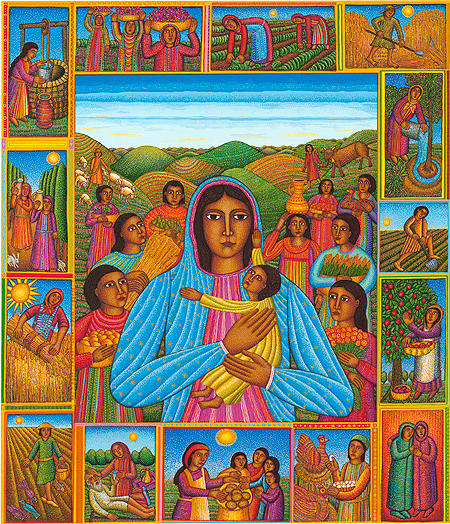 • It took 66 days to travel the 2750 miles (an average speed of two miles per hour) to the “New World” coast, arriving 9 November 1620 just north of Cape Cod. The ship’s original destination was the Hudson River’s mouth in what is now the New York City harbor, but storms blew them off course.
• It took 66 days to travel the 2750 miles (an average speed of two miles per hour) to the “New World” coast, arriving 9 November 1620 just north of Cape Cod. The ship’s original destination was the Hudson River’s mouth in what is now the New York City harbor, but storms blew them off course.
• The event now commemorated in the United States at the end of November each year is more properly described as a harvest festival (of which there are many in the world). The original festival was probably held in early October 1621 and was celebrated by the 53 immigrants who survived that first harsh winter, along with Wampanoag Chief Massasoit and 90 of his men.
•The Wampanoag were not invited in advance to the first “thanksgiving” feast. The English settlers had just harvested their first crops and celebrated by firing their guns. Wampanoag Chief Massasoit’s men heard the gunfire and, thinking the settlers were being attacked, ventured into the village. Then the settlers invited them to join the feast. Realizing there was not enough food, Massasoit’s men went hunting and brought back deer.
¶ Oh, Come Let’s NOT Adore Him. “Don’t give me the innocent stuff, they [relatives of ISIS combatants] are not innocent. This is a war and you can’t worry about blood on your hands no matter whose it is. If you are wondering ‘what would Jesus do?’ I suggest you wonder ‘what would Joshua do?’” —recent letter to the editor in the “Asheville Citizen-Times”
¶ Intercession. “Oh, if answers to our global wounds could be gathered like wild flowers in the spring, brought home, 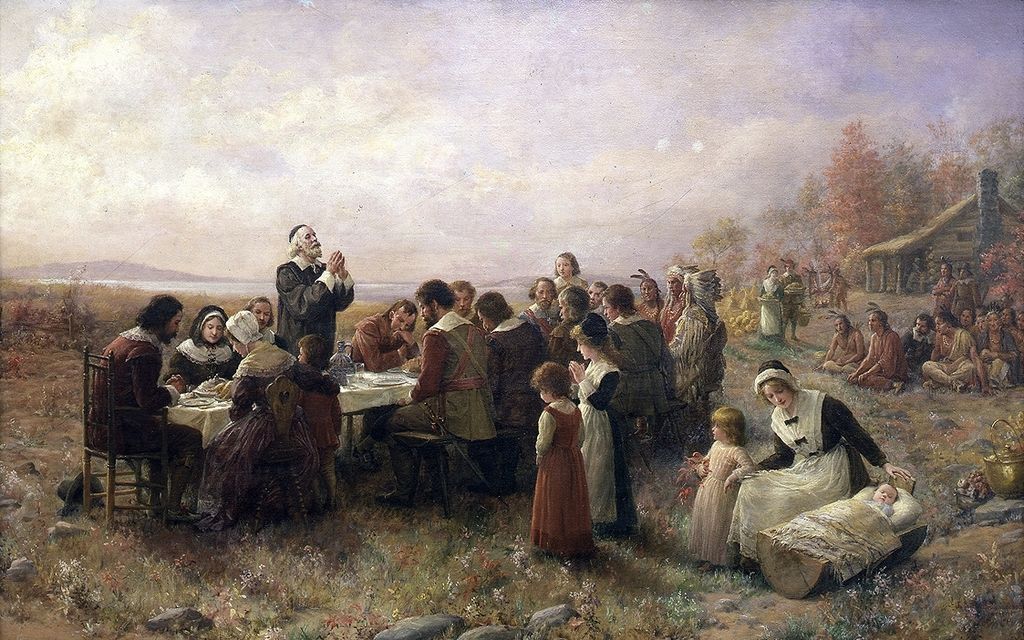 placed in a vase of water blessing us with the simplicity of their beauty and shared with others, what would our world be then? I can only try to be one of those stems, sharing the best I can be, if only for a moment. —Chaplain Susan Turley, in a Facebook post
placed in a vase of water blessing us with the simplicity of their beauty and shared with others, what would our world be then? I can only try to be one of those stems, sharing the best I can be, if only for a moment. —Chaplain Susan Turley, in a Facebook post
¶ Words of assurance. “If the only prayer you say in your life is thank you, it will be enough.” —Meister Eckhart (1260-1328), German theologian and mystic
¶ Fun facts about Thanksgiving.
•Benjamin Franklin felt the eagle a “bad moral character” and thus wanted the turkey, a “much more respectable bird,” to be the national bird of the United States.
•Thomas Jefferson thought the concept of Thanksgiving was "the most ridiculous idea I’ve ever heard."
•Some historians—and many Virginians—say the first Thanksgiving took place on the James River southeast of Richmond. On December 4, 1619, a year before the Mayflower left port, the settlers at today’s Berkeley Plantation gave thanks for their safe landing by order of the colony’s investors, who demanded the date be kept perpetually “as a day of Thanksgiving to Almighty God.”
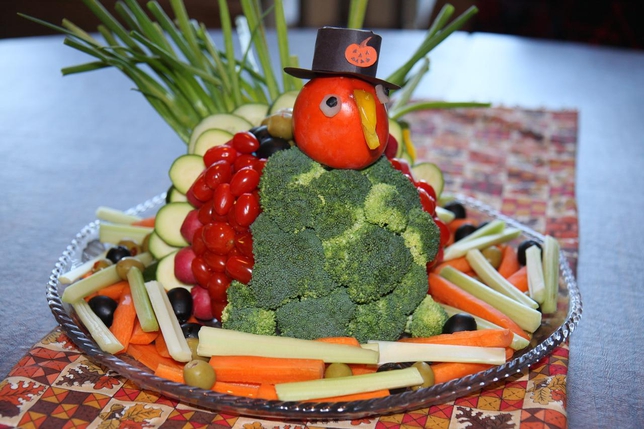 •Last year emergency calls to the “turkey hotline” (800-288-8372, in case you need it) jumped 165%. Must be all those culinary-challenged Millennials and their post-modern prejudice against actual recipes, such that they are now “carried about with every wind of [comestible] doctrine” (Ephesians 4:14 KJV).
•Last year emergency calls to the “turkey hotline” (800-288-8372, in case you need it) jumped 165%. Must be all those culinary-challenged Millennials and their post-modern prejudice against actual recipes, such that they are now “carried about with every wind of [comestible] doctrine” (Ephesians 4:14 KJV).
•Why is it called a turkey? Back in the day, the Europeans took a liking to the guinea fowls imported to the continent. Since the birds were imported by Turkish merchants, the English called them turkeys. Later, when the Spaniards came to America, they found a bird that tasted like those guinea fowls. When they were sent to Europe, the English called these birds "turkeys" as well.
•Fossil evidence shows that turkeys roamed the Americas 10 million years ago.
•President Abraham Lincoln first ordered, on 28 November 1861, the closing of federal government offices to close for a local day of thanksgiving. Two years later, on 3 October 1863, he issued a formal proclamation setting the last Thursday in November as a national day of thanksgiving. However, it wasn’t until 1941 that Congress made the holiday official.
•Our Canadian friends celebrate Thanksgiving Day (Jour de l'action de grâce) on the second Monday of each October. (And, yes, the Canadian Football League plays—not one game, but a doubleheader—on Thanksgiving Day, though they have funny rules.)
•TV dinners have Thanksgiving to thank. In 1953, someone at the Swanson company misjudged the number of frozen turkeys it would sell that Thanksgiving—by 26 tons! Some industrious soul came up with a brilliant plan: Why not slice up the meat and repackage with some trimmings on the side? Thus, the first TV dinner was born!
•More alcohol is sold on the Wednesday before Thanksgiving than any other day of the year. The Friday after Thanksgiving is the year’s busiest shopping day and the busiest day for plumbers.
•The first dish I learned to cook (if opening cans, mixing them in a dish and heating can be considered cooking) was green 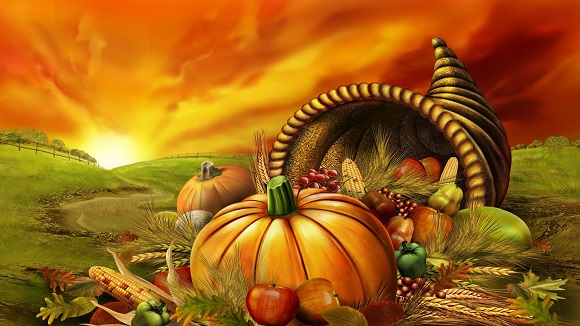 bean casserole, a Thanksgiving table tradition (except at our house). Its inventor, Campbell Soup Company employee Dorcas Reilly, was inducted into the Inventor’s Hall of Fame following her 1955 tour de force.
bean casserole, a Thanksgiving table tradition (except at our house). Its inventor, Campbell Soup Company employee Dorcas Reilly, was inducted into the Inventor’s Hall of Fame following her 1955 tour de force.
•Some 43 million US citizens will take to the road this Thanksgiving weekend.
•Confused about the difference between yams and sweet potatoes? (It’s highly unlikely you’ve ever eaten a yam, which can grow to five feet in length; and they’re not commercially produced here). Here’s a helpful article explaining the difference.
•Shopping has always been the twinkle in the eye of Thanksgiving promoters. In 1939, 1940 and 1941, President Roosevelt set the Thanksgiving observance a week early, as a way to spur economic growth and extend the Christmas shopping season.
•The last time Hannukkah and Thanksgiving coincided was in 1888. It won’t happen again for 70,000 years.
•The transliterated Greek word for “thanksgiving” is “eucharistia.”
¶ “Pilgrims owe their lives to patron saint Squanto” (Tisquantum), who taught the early English settlers to grow food, build 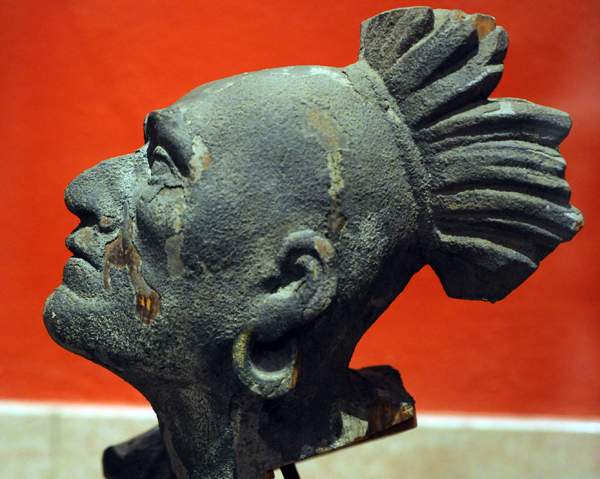 houses from native materials, and mediated relations with Native people in the region.
houses from native materials, and mediated relations with Native people in the region.
¶ Text often quoted by the English settlers. “Ask of me, and I shall give thee the heathen for thine inheritance, and the uttermost parts of the earth for thy possession.” —Psalm 2:8
¶ A Cherokee friend once commented to me, “When Columbus stumbled upon this hemisphere, he thought it was India, and we’ve been “Indians” ever since. Good thing he didn’t think he’d landed in Turkey.”
¶ Overshadowed in the consumptive habits that now characterize our Thanksgiving holiday is the virtue of the family gatherings. The sustaining power of those memories are celebrated in “Wanting Memories,” by Ysaye M. Barnwell, performed here by Sweet Honey in the Rock.
¶ Of course, the ache from the absence of family now passed, or living far away, is also part of the day, as Ray Davies’ captures in “Thanksgiving Day.”
¶ Traditional American values. “President Obama stated that to ‘close the doors in their [the refugees’] face would undermine our American values.’ Although I welcome refugees escaping religious persecution, we should not be 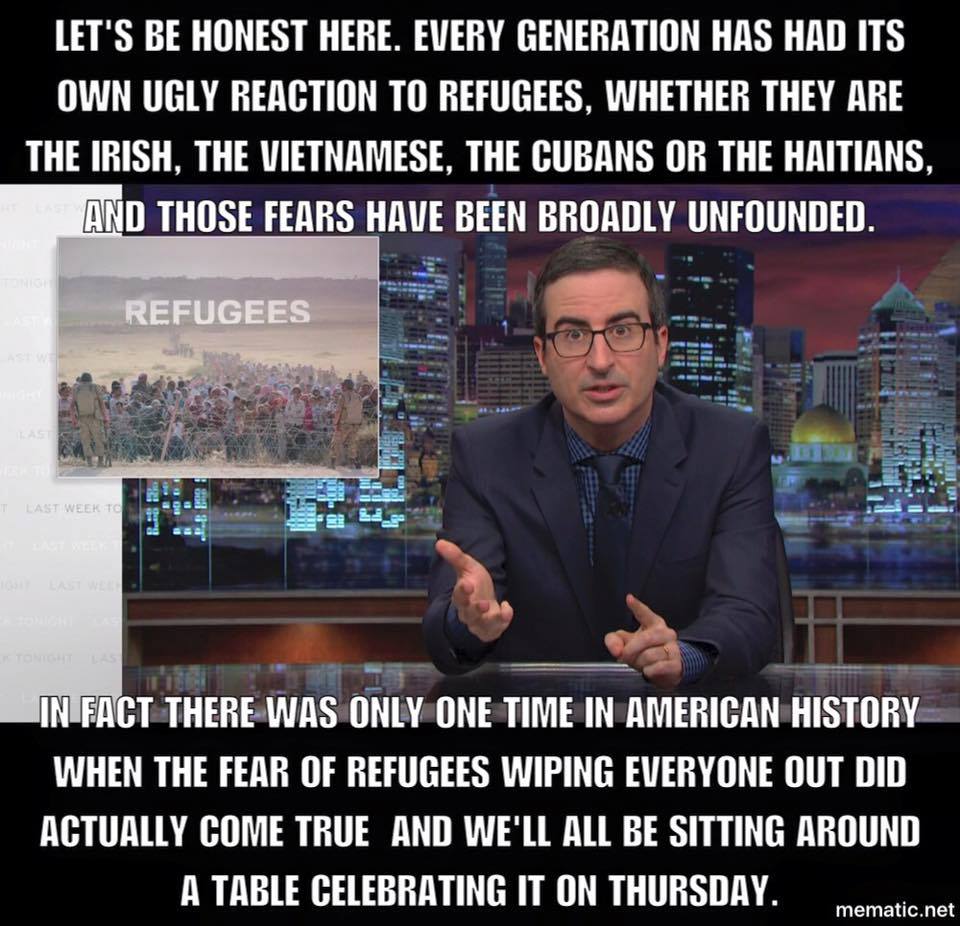 compromising America’s security for the sake of ‘values.’” —recent letter to the editor in the “Asheville Citizen-Times”
compromising America’s security for the sake of ‘values.’” —recent letter to the editor in the “Asheville Citizen-Times”
¶ Few have heard of King Philip’s War, the bloodiest—in terms of the percentage of population killed—in our history. In World War II the US lost just under 1% of its adult male population; in the Civil War, the figure was 4-5%. In King Philip’s War (also called the First Indian War), 8% of the English colonists died and, far more profoundly, the Native population of southern New England sustained a loss of 60-80%, counting those who died in battle, illness, or from forced migration. King Philip was the adopted English name of the Wampanoag Nation Chief Metacomet. —Nationiel Philbrick, “Mayflower: A Story of Courage, Community, and War”
¶ Consider participating in StoryCorps’ “The Great Thanksgiving Listen” (see this 1:10 minute video), collecting audio recordings of your elders, plus a follow up video, “Interview Tips With Steve Inskeep,” host of NPR Morning Edition.
¶ My friend Sharon Buttry, one of the most effective community organizers and interfaith activists I know, is preparing to cook Thanksgiving dinner using her newly-installed wood stove. Read her “Grandma’s Stove” reflection in ReadTheSpirit (a great source on the web for interfaith news, insight and inspiration).
¶ The “Charlie Brown Thanksgiving” video (8:35 minutes) is a tradition in some households.
¶ Baby Blues cartoon. Wanda, in distress: “I can’t do it again, Darryl!” who then responds, “Yes you can! You have to!”
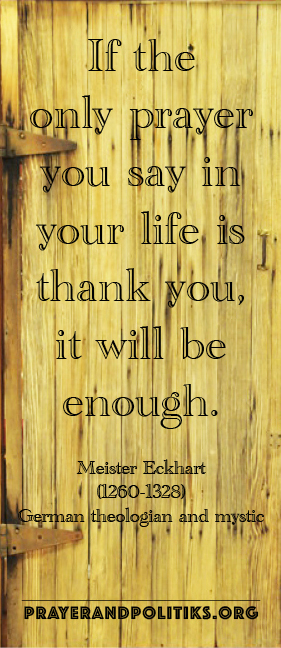 “But it’s so much work!” she says. “I’ll help,” he offers.
“But it’s so much work!” she says. “I’ll help,” he offers.
“Couldn’t we just order pizza for Thanksgiving?”
“Wanda, if we give up, the turkeys win!”
¶ Pastor John Robinson’s farewell sermon to that part of his migrating Separatist congregation (aka the Pilgrims) when they disembarked are these memorable lines which we can and should cherish:
“If God reveal anything to you by any other instrument of His, be as ready to receive it as you were to receive any truth from my ministry, for I am verily persuaded the Lord hath more truth and light yet to break forth from His holy word. The Lutherans cannot be drawn to go beyond what Luther saw. Whatever part of His will our God has revealed to Calvin, they (Lutherans) will rather die than embrace it; and the Calvinists, you see, stick fast where they were left by that great man of God, who yet saw not all things. This is a misery much to be lamented.”
¶ Helpful hints. “Five Things to Do When an Anti-Muslim Hate Rally Comes to Town,” Jordan Denari, Sojourners.
¶ Preach it. “If the only prayer you say in your life is thank you, it will be enough.” —Meister Eckhart (1260-1328), German theologian and mystic
¶ Call to the table. “To journey without being changed is to be a nomad. To change without a journey is to be a chameleon. To journey and be transformed by the journey is to be a pilgrim.” —Mark Nepo
¶ Lectionary for Sunday next. “Zechariah’s question to the angel—‘How will I know that this is so? For I am an old man, and my wife is getting on in years?’—is pretty much the same as Mary’s question—‘How can this be, since I am a virgin?’ Both are skeptical. Both raise the question of biological impossibility. Yet Mary immediately launches into her song of praise, while Zechariah goes dumb, unable to speak.” —read Ken Sehested’s “Same question, different outcomes: A meditation on Zechariah”
¶ Just for fun from Ellen DeGeneres, “Ellen’s Got Your Thanksgiving Seating Arrangement” (5:35 minutes).
 ¶ Benediction. “Sorrow everywhere. Slaughter everywhere. If babies / are not starving someplace, they are starving / somewhere else. With flies in their nostrils. / But we enjoy our lives because that's what God wants…. / We must risk delight. We can do without pleasure, / but not delight. Not enjoyment. We must have / the stubbornness to accept our gladness in the ruthless / furnace of this world. To make injustice the only / measure of our attention is to praise the Devil.” —Jack Gilbert, “A Brief for the Defense”
¶ Benediction. “Sorrow everywhere. Slaughter everywhere. If babies / are not starving someplace, they are starving / somewhere else. With flies in their nostrils. / But we enjoy our lives because that's what God wants…. / We must risk delight. We can do without pleasure, / but not delight. Not enjoyment. We must have / the stubbornness to accept our gladness in the ruthless / furnace of this world. To make injustice the only / measure of our attention is to praise the Devil.” —Jack Gilbert, “A Brief for the Defense”
¶ Recessional. Natalie Cole, “Be Thankful.”
# # #
Your support sustains prayer&politiks’ curiosity and computer screen glow. An early retirement Social Security check is our only subsidy. Use the “donate” button on this site or send your contribution to prayer&politiks, c/o Sehested, 358 Brevard Rd, Asheville NC 28806. For a contribution of $52 or more, we'll send you a free copy of "In the Land of the Living: Prayers personal and public."
Featured this week on prayer&politiks:
•“All the day long,” a litany for worship inspired by Psalm 25
•“Boundary to Benedictus,” a poem about the Luke 1 story about Zechariah
•“Same question, different outcomes: A meditation on Zechariah”
•“Venite Adoremus (Come and Adore),” an Advent poem
©Ken Sehested @ prayerandpolitiks.org. Language not otherwise indicated above is that of the editor. Don’t let the “copyright” notice keep you from circulating material you find here (and elsewhere in this site). Reprint permission is hereby granted in advance for noncommercial purposes.
Your comments are always welcomed. If you have news, views, notes or quotes to add to the list above, please do. If you like what you read, pass this along to your friends.
by Ken Sehested
I have given birth countless
Times, too many stillborn
And breathless, despite
Conception in the
Throes of passion and
Patient preparation. Restless
Nights and nauseous days
And stretch marks
Amniotic fluid securing watery
Life, waiting, kicking
Kicking and waiting
Anxious about that
Birth canal’s tumultuous ride
And leaky breasts
Until then, waiting, kicking
Kicking and waiting
Waddling stride
Provoking curious stares
Down Broadway in
Manhattan and
Comments from strangers
On the bus, a complete stranger
Saying, I bet it’s a girl
No, says another across
The aisle, she’s carrying
High, it’s a boy, with unseen
Choired angels arrayed
testing their pitch:
Venite adoremus!
Come and adore!
Who are these people? Why
Didn’t I ask for phone numbers
And maybe recipes? But they
Barrel on past my stop to
Where I wish I knew. Who is
Waiting for them, I wonder, like
Those truckers I notice rumbling
On up the interstate when I exit
For gas and a pee, no need for
My company, four-wheelers
Just get in the way
How far have you been
Today? I want to ask
How far are you going? Who
Did you leave behind?
And who’s expecting you home
For supper and maybe
A little foreplay? At how
Many weigh stations
Have you caught a nap? How
Many amphetamines
With a coffee chaser?
Careful, lane closed ahead
And some fool in an aging
Skylark thinks he can jump
The line. How long must
Shaving drive-time pad
Your paycheck?
Back on the Broadway
Bus: Would that every
Harbinger of new life
Had such power to soften
Calloused eyes, disarm
Suspicion, open avenues of
Conversation and familial
Approach between those with
No calculation, no stalkers, no
Chance of profit from the
Encounter.
Venite adoremus!
Truckers would trade a
Tailwind for such
Encounters. Surely there’s
More to life than the load
Back to my projects: Not
Children, exactly, though
Something like that, each with
Distinctive histories, names, even
And aspirations, so many that
I’ve forgotten more than
I know. You get used to
Stillbirth or you drown in
Tears. Sometimes, like
Tonight, I would prefer
That drowning, but that’s
Just the endorphin shortage
Talking, and lament’s
Communion with brother
Jack Daniel
Let’s just sleep on it
And trust the daybreak’s
Rise to bring more
Light than heat
If saying your prayers
Is an obstacle to
Prayer, cut it out (as
Bro. Merton advised)
Anyway, I’m too transparent
To go fooling any
Heavenly host or another
Hell, I publish books
As a hobby
Stocking stuffers, Amazon
Resellers for pennies
A page. If a fool I am
Let me not be suffered
But give me a
Wall to build stretching
To every sunrise’s horizon
For the sheer beauty
Of assembled stones
Of channeling gravity
To welcome every riprap
Rock’s homely shape.
Venite adoremus!
There are no
Disingenuous stones, nor
Do they preen for
Attention. They have
Learned patience over
The eons, like the
18-wheelers up the
Long stretch of
I-25 miles of northern
New Mexico, Cherette Mesa
Out the port side
Just up from Wagon Mound
And countless other
Sentries in the Land of
Enchantment outlined by
Full moon, the night sky
Sprayed with falling
Stars*, though none of
Them, as yet, displaying the
Signs of Salvation’s advance
I want that
Equanimity in the
Face of history’s
Pileups and projects’
Ruin. Some of those
Bus patrons in
Manhattan and
Highway cowboys
Headed north on I-25
Want it, too, at least
As far as Washington
Heights (for the former)
Where you have
To transfer, or Buffalo
Wyoming (for the latter)
Where you have
To pick another number
I’ll bet lovers there
Suffer stillborns, too, and
Dreamers who believe
Another world is not
Only possible but
Promised as well
Living to tell about it
In splendiferous oblation
Venite adoremus!
While semis jake brake into
Town, maybe pick up
The winning lottery
Ticket with their diesel
And a shower, maybe pie
Too. No Doubt they have
Projects as well, named
Or unnumbered and tears
Enough to spare
When will death’s destiny
Be sealed in its grave?
Whence come the signs*
Displayed by sun and moon
And stars and all earth’s
Distress, heaven itself
Shaking from the salvos
Launched as the empire’s
Rage against every
Economy off grace?
Foretell the promised
Arrival, marked by might
Perfected in mercy
Bridling the clouds with
Exaltation of the One
Whose embrace shelters
Every failed project, every
Homely rock’s shape, soothing
Every creature’s grief, every
Tear’s salty sting.
Hail, Mary, full of grace
Fearlessly staring shame
Back to perdition and
Welcoming resurrection
From the grave, be with
us now and at the
Hour of our death
Let earth’s habitation
Take its stand, all heads
Raised, scouring the
Horizons of sight and sound
For hints of Redemption’s
Disclosure. Venite, venite,
Venite adoremus!
O come, O come, O come
Let us adore!
by Ken Sehested
The Manger’s trailhead opens at
the portal of praise and genuflecting
thanks. Not because heaven arises to
piety’s incense. But because Advent’s
brush with mortal flesh is a perilous journey,
fraught with insurrection’s threat,
pregnancy’s scandal, birthed from
stabled bed, and Herod’s foam and fury.
The innocents take it in the chops every
time. Yet Advent threatens treason to
every Herod-hearted arrangement.
Alas, deliverance is a long time coming,
and grows longer still. Because vultures
still circle when nations preen, sanctifying
fields with opened veins, feeding sepulchers,
their reap still grim. Only praise-practiced
souls have a slip of a chance, because they
know the dance that sustains through
malice and maim and every menacing
flame. Only laudatory aria echoes to
each distant hollow, every craggy perch,
destined to breach the deepest dungeon’s seal.
To say thanks is to honor an alliance and
affirm a reliance beyond self-encumbered
competence and conceit. To praise is to
raise the eyes, staring dauntless in the
face of lies and all manner of threat,
breaking the hold of regret, anchored
in the assurance that not even death
can check the Breath that crests over
bleached bone and scorched lung,
aspiring life beyond all knowing.
Only canticles can tell. Only thanks can
hallowing render. Only praise can
leverage the earth’s maddening orbit back
to its Rightful Tender. No longer shall
the beggarly be auctioned to satisfy
ravenous demand, but they shall find
refuge, deliverance, in secured
Promised Land. For the Blessed One
has vowed a ransomed release from
misery’s increase: healing the lamed,
gathering the shamed, transforming
their weeping to a torrent of praise.*
Torrential praise.
Rapturous,
irrepressible,
resplendent praise.
Oh come
let us
adore.
19 November 2015 • No. 46
¶ Invocation. "Malka moma” (“Little Girl”), Bulgarian folk song performed by Neli Andreeva and the Filip Kutev Ensemble.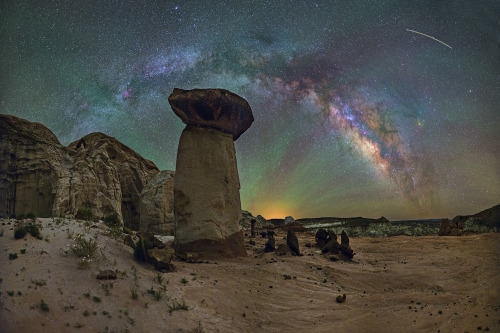
¶ Call to worship. “Come ye fearful people come / Cast your sighs to highest heav’n / Yet—though terror’s harvest spread, / Casting sorrow in its stead— / Still the Promise doth endure / Life abounding to secure / Come, ye thankful hearts, confess / Mercy’s lien o’er earth’s distress.” —Ken Sehested, new verse to “Come, Ye Thankful People, Come”
¶ Good news. “On Sunday, Nov. 15, 2015, during the 175th anniversary event for the Witherspoon Street Presbyterian Church, the Presbyterian Church (USA) Synod of the Northeast will clear the church’s debt of approximately $175,000 as an act of racial reconciliation.” (Thanks Evelyn.)
¶ Congratulations to the Fellowship of Reconciliation (USA) on their centennial anniversary! FOR is the world’s oldest  multi-faith peace-building organization.
multi-faith peace-building organization.
¶ Song of praise. Sydney Carter’s “Lord of the Dance” performed by LordSong.
¶ A retro photo of Meryl Streep is circulating on the internet, with this commentary from the famous actor:
“This [photo, in a New York subway train] was me on my way home from an audition for King Kong where I was told I was too ‘ugly’ for the part. This was a pivotal moment for me. This one rogue opinion could derail my dreams of becoming an actress or force me to pull myself up by the boot straps and believe in myself. I took a deep breath and said ‘I'm sorry you think I'm too ugly for your film but you're just one opinion in a sea of thousands and I'm off to find a kinder tide.’”
If you’re counting, Streep now has 19 Oscar and 29 Golden Globe nominations—both records in the acting industry.
¶ Prayer of intercession. “later that night / i held an atlas in my lap / ran my fingers across / the whole world / and whispered / where does it hurt? / it answered / everywhere / everywhere / everywhere.” —Somali-British poet Warsan Shire
¶ Words of assurance. Monks at the Suzdal (Russia) Monastery singing Chesnokov’s “Mystical Sacrifice.”
¶ Uh-oh. “Study: Religious Kids Are Jerks,” Bobby Azarian. “A study published in the journal Current Biology testing the 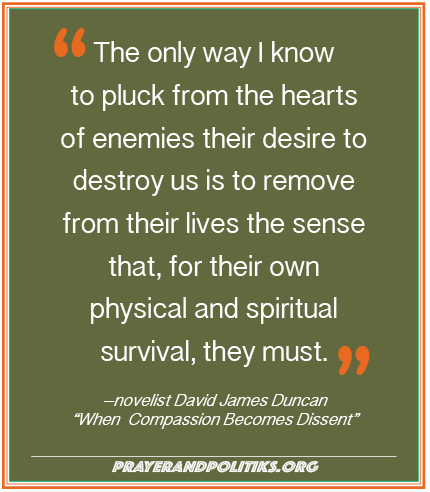 behavior of Christian, Muslim, and atheist children has found that religious kids are meaner and less generous.” (Present company excepted, of course.)
behavior of Christian, Muslim, and atheist children has found that religious kids are meaner and less generous.” (Present company excepted, of course.)
¶ Turn off the news for a minute and read this short anecdote by Naomi Shihab Nye.
“Wandering around the Albuquerque Airport Terminal, after learning my flight had been delayed four hours, I heard an announcement: ‘If anyone in the vicinity of Gate A-4 understands any Arabic, please come to the gate immediately.’ Well—one pauses these days. Gate A-4 was my own gate. I went there.
“An older woman in full traditional Palestinian embroidered dress, just like my grandma wore, was crumpled to the floor, wailing. ‘Help,’ said the flight agent. ‘Talk to her. What is her problem? We told her the flight was going to be late and she did this.’” —continue reading "Gate A-4"
¶ Speaking of Nye, you’ll love this poem, “One Boy Told Me” (2:37 minutes).
¶ Then read “Christians, Muslims grieving for Paris together,” a short blog post by “Merely Me.” (Thanks, Norman.)
¶ Immgration again to the forefront of presidential candidates’ debate. “4 lies about immigration” is Robert Reich’s dollars-and-cents rebuttal of common “myths” about the social costs/benefits of immigrants (2:21 minutes).
¶ “When I talk to conservative Christians about their stance on a hot button issue like abortion or gay marriage, they  usually quote the Bible. But when I’ve spoken to them about admitting Syrian refugees, almost none of them do.” See more about why as Kathleen Newland, a senior fellow at the Migration Policy Institute in Washington, says, “The refugee resettlement program is the least likely way for a terrorist to infiltrate the US.” —Jonathan Merritt, Religion News Service
usually quote the Bible. But when I’ve spoken to them about admitting Syrian refugees, almost none of them do.” See more about why as Kathleen Newland, a senior fellow at the Migration Policy Institute in Washington, says, “The refugee resettlement program is the least likely way for a terrorist to infiltrate the US.” —Jonathan Merritt, Religion News Service
¶ Before interrogating Muslims on religiously-sanctioned violence, Jews and Christians must first come to terms with their own sacred texts, such as:
•“Thou shalt surely smite the inhabitants of that city [which has worshiped other gods] with the edge of the sword, destroying it utterly, and all that is therein, and the cattle thereof, with the edge of the sword.” —Moses, relaying God’s command to the children of Israel, Deuteronomy 13:15
•“Now go and attack Amalek, and utterly destroy all that they have; do not spare them, but kill both man and woman, child and infant, ox and sheep, camel and donkey.” —Hebrew judge and prophet Samuel, prefacing the instruction with “thus says the Lord of hosts” to King Saul, 1 Samuel 15:3
• “Happy shall they be who take your [the Babylonians’] little ones and dash them against the rock!” —Psalm 137:9
¶ And then there’s history like this. “It was a fearful sight to see them thus frying in the fire and the streams of blood 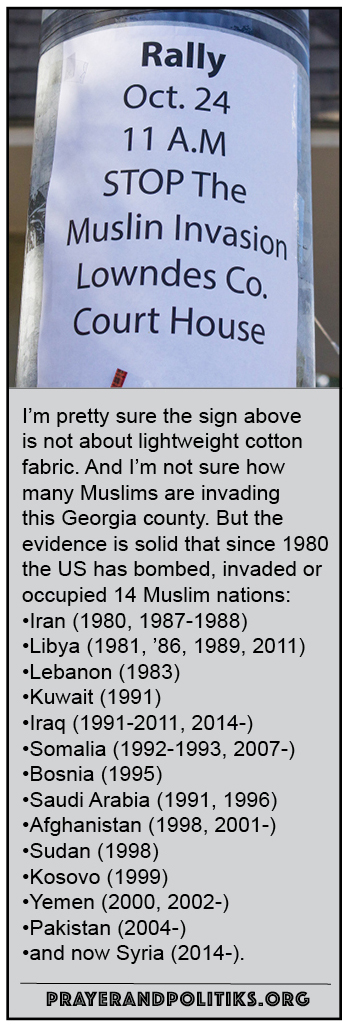 quenching the same, and horrible was the stink and scent thereof; but the victory seemed a sweet sacrifice, and [we] gave the praise thereof to God.” —William Bradford, governor of the early Plymouth Colony, writing in 1637 of his Pilgrim community’s annihilation of a Pequot Indian village along the Mystic River
quenching the same, and horrible was the stink and scent thereof; but the victory seemed a sweet sacrifice, and [we] gave the praise thereof to God.” —William Bradford, governor of the early Plymouth Colony, writing in 1637 of his Pilgrim community’s annihilation of a Pequot Indian village along the Mystic River
¶ “Army of God? 6 Modern-Day Christian Terrorist Groups You Never Hear About,” by Alex Henderson, AlterNet.
¶ “How do we stop young Muslims becoming radicalised?” is the question we now continually ask. But it’s a deeply misleading question . . . . We buy into the radicalisation hypothesis because we want evil to be mysterious and other; something that has nothing to do with us. We want to tell ourselves that we are secular and enlightened and so have no part in all of this bloodshed. It’s what people commonly do with evil – we conceptualise it as being as far away from us as possible. But if Islamic terrorism is really all about politics, then we have to admit that the long history of disastrous western interventions in the Middle East is a part of the cause of the horror that continues to unfold. In other words, we have to face our responsibility.” —Giles Fraser, “It’s not religion that creates terrorists, it’s politics”
¶ For background. Ever wondered why the jidahist group most in the news these days goes by several names, e.g., ISIS, ISIL, Islamic State, Daesh? Read Lauren Markoe’s helpful explanation.
¶ “Not in my name—Muslims against ISIS.” A group of young British Muslims have joined the fight back against Islamic State militants with a video (1:19 minutes) and social media campaign.
¶ Allah says: “Whosoever kills an innocent human being, it shall be as if he has killed all mankind, and whosoever saves the life of one, it shall be as if he had saved the life of all mankind…” —Qur’an 5:32
¶ “Paris Attack Leads to Calls for Religious Discrimination in Law Enforcement, Immigration," by Don Byrd, Baptist News Global.
¶ “The ‘war on terrorism’ is violent and punitive. The war will be won by those who are able to exact the higher price in lives and resources, by those who are able to instill the greater fear. In short, the victor in a violent war on terrorism will be the party that is most adept at inflicting terror. . . . The only peace that can come from the effort to oppose terror with terror is the peace of the graveyard.” —Lee Griffith (Griffith’s relatively-unknown “The War on Ter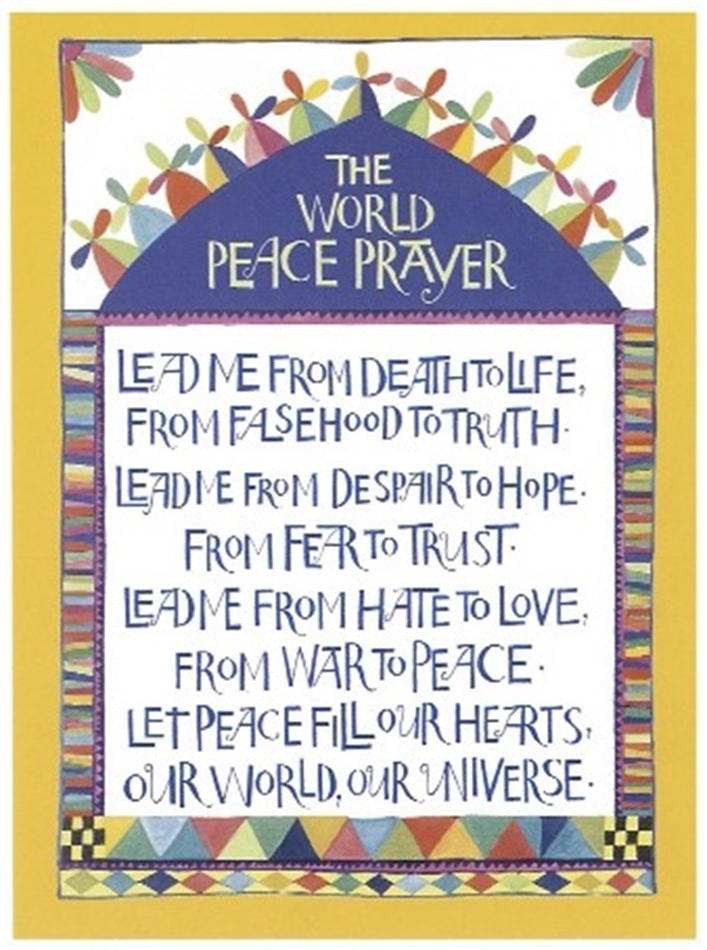 rorism and the Terror of God” is the best book I know for its combination of analysis and theological reflection.)
rorism and the Terror of God” is the best book I know for its combination of analysis and theological reflection.)
¶ “Four former U.S. Air Force drone operators issued a public letter on Wednesday warning that the United States' ongoing targeted killing program ‘is one of the most devastating driving forces for terrorism and destabilization around the world.’ The letter, addressed to U.S. President Barack Obama, Defense Secretary Ashton Carter, and CIA Chief John Brennan accuses the administration of fueling ‘tragedies such as the attacks in Paris’ while ‘lying publicly about the effectiveness of the drone program.’” —Lauren McCauley, Common Dreams
¶ The fear of religion’s bloodletting legacy. “Why Downton [‘Downton Abbey,” the popular BBC drama] doesn’t do God: TV chiefs ordered show’s creators to ‘leave religion out of it’ in case they upset viewers.’” —Amanda Williams, Mailonline
¶ Preach it. “If the faith doesn’t call us all to humility and release of unjustified privilege—especially over the stranger—it is not safe for our melting earth. If you are a Christian and you think that Jesus loves you more than Jihadi John, you don’t know Jesus. And, it follows, you probably don’t know much about John, either. . . . Beware a faith that fits quietly around a fist.” —Gary Gunderson, “small god” 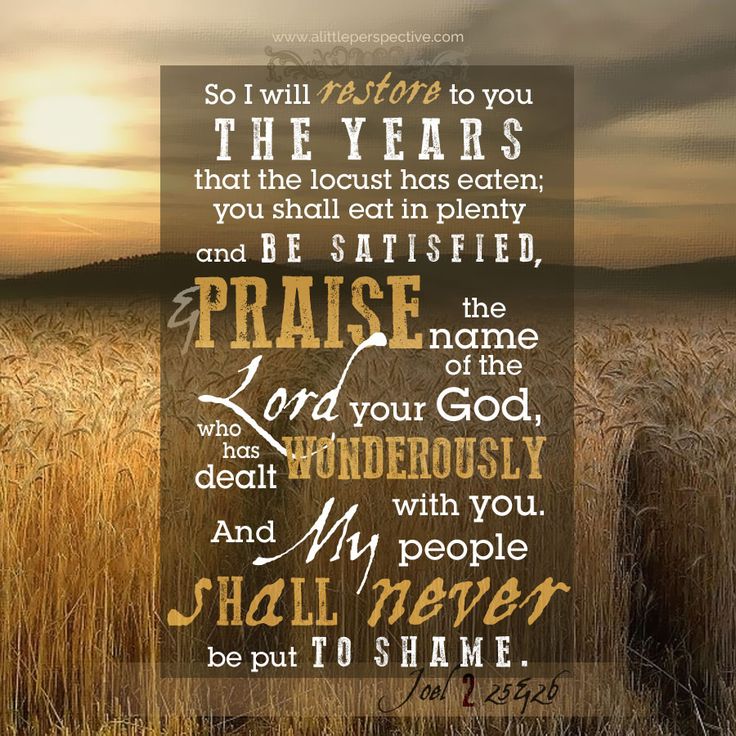
¶ Despite being among the most repressive regimes in the world, Saudi Arabia is about to receive a $1.29 billion arms purchase of bombs and munitions from the US, one month after the US approved an $11.25 million in combat ships. According to the United Nations, the Saudi Arabia’s seven-month military assault on Yemen has already taken the lives of over 2,300 civilians, wounding nearly 5,000 others.
Can you guess why? According to a spokesperson for the US Defense Security Cooperation Agency, the purchases insure “defense,” “stability in the region,” and . . . wait for it . . . “to safeguard the world’s largest oil reserves.” —Sarah Lazare, Common Dreams
¶ Lection for Sunday next. “O children of Zion, be glad and rejoice in the Lord your God; for God has given the early rain for your vindication. The threshing floors shall be full of grain, the vats shall overflow with wine and oil. I will repay you for the years that the swarming locust has eaten, the hopper, the destroyer, and the cutter, my great army, which I sent against you. You shall eat in plenty and be satisfied, and praise the name of the Lord your God, who has dealt wondrously with you. And my people shall never again be put to shame.” —Joel 2:23-26
¶ Just for fun. Photos of “15 woodpiles that have been stacked into gorgeous works of art.”
¶ C all to the table. “There is room at the table for everyone,” by Carrie Newcomer.
all to the table. “There is room at the table for everyone,” by Carrie Newcomer.
¶ Altar call. “No one heals himself by wounding another.” —St. Ambrose of Milan
¶ Benediction. “It is the resurrection which is the terror of God to all who believe that death should have the final word. It is the promise of the resurrection which renders null and void the victories of all who shed blood.” —Lee Griffith
¶ Recessional. Charles-Marie Widor, Toccata from Symphony No. 5 (6+ minutes).
# # #
Your support keeps the prayer&politiks lights on. An early retirement Social Security check is our only subsidy. Use the "donate" button on this site or send your contribution to prayer&politiks, c/o Sehested, 358 Brevard Rd, Asheville NC 28806. For a contribution of $52 or more I'll send you a free copy of In the Land of the Living: Prayers personal and public.
Featured this week on prayer&politiks:
•“Testimony in a Time of Terror,” a litany for worship
•“When life is violated: Grist for the contemplative mill in seasons of trouble,” a collection of quotes
•“Blood moon arising,” a litany for worship inspired by Mark 13:24-37, Joel 2:31, Daniel 7:13, Acts 2:20, Revelation 6:12
Special resources for Thanksgiving
•“On saying thanks,” a poem for Thanksgiving
•“Come Ye Thankful (and Ye Cranky) People Come,” by Abigail Hastings, a Thanksgiving call to worship
•“Why is it so hard to say thanks? 10 reasons”
•“Now Thank We All Our God,” revised lyrics
©Ken Sehested @ prayerandpolitiks.org. Language not otherwise indicated above is that of the editor. Don’t let the “copyright” notice keep you from circulating material you find here (and elsewhere in this site). Reprint permission is hereby granted in advance for noncommercial purposes.
Your comments are always welcomed. If you have news, views, notes or quotes to add to the list above, please do. If you like what you read, pass this along to your friends.
Subscribers receive full access to the entire prayer&politiks site. It’s free. Each week you will receive an automated email with a link to the new edition of the Signs of the Times column. All you provide is you name, email address and city, state or province, and country. This information is never shared with any other party. The only other agreement you make is to receive two solicitation letters per year, one in the spring, the other in the fall. (Which you are free to ignore. Your subscription is still free, and you may “unsubscribe” at any time.) This is our modern begging-bowl. Contributions are our sole source of support.